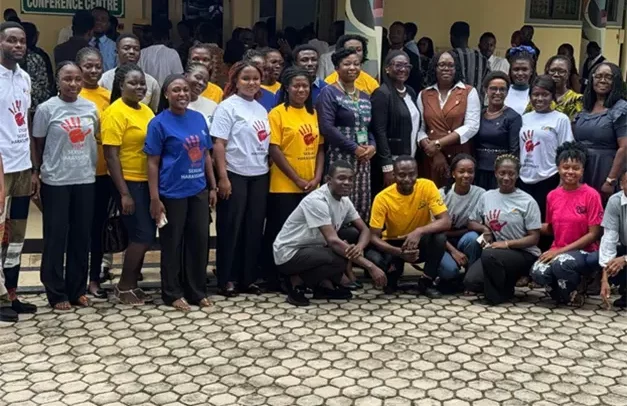A group photograph of the speakers and participants
In a bid to combat Gender-Based Violence (GBV) on university campuses, the Kwame Nkrumah University of Science and Technology (KNUST), in partnership with the Perfector of Sentiments (POS) Foundation, held a comprehensive awareness programme on Monday, June 23, 2025. The initiative is part of a five-university campaign aimed at educating students, strengthening reporting systems, and building safer learning spaces across the country.
The event, funded by AmplifyChange, forms part of a broader effort by the POS Foundation to engage students and stakeholders at the University of Education, Winneba; University of Cape Coast; University for Development Studies (UDS); University of Ghana; and KNUST on the pressing issue of GBV.
Addressing the gathering, the Founder and Executive Director of the POS Foundation, Jonathan Osei Owusu, described the rising cases of harassment on campuses as a reflection of broader societal problems, fueled by ignorance, lack of awareness, and weak reporting structures.
“We’ve been championing human rights for years—from criminal justice reform to national and international advocacy. But now, more than ever, we must focus on what’s happening in our universities,” Mr. Osei Owusu said.
“Some students don’t even know what constitutes sexual harassment, while others underestimate its seriousness. That’s why we are here at KNUST—to educate, sensitise, and empower.”
He commended KNUST for its proactive measures, including the development of a mobile application that enables students to report harassment cases anonymously—a move he said should be replicated at other universities.
“Anonymous reporting helps identify repeat offenders and systemic problems. It allows institutions to take action without putting victims at further risk. KNUST’s app is a good model—one that we hope other universities will adopt,” he noted.
Mr. Osei Owusu also raised concerns about the increasing trend of student-to-student abuse, especially in romantic relationships, which in some cases has escalated into violent assaults.
“Our young people must understand that gender-based violence is not just wrong—it can destroy lives, derail education, and rob them of their future,” he stressed.
Also speaking at the event, Deputy Registrar and Head of the KNUST Counselling Centre, Victoria De-Graft Adjei, emphasised the emotional and psychological toll gender-based violence inflicts on victims, especially women.
“Reporting is often difficult because of stigma and fear of judgment,” she said. “Victims are blamed—‘Why were you wearing that?’ ‘Why did you go there?’—but these questions never justify abuse. And unfortunately, it’s mostly women who suffer the consequences,” she said.
She revealed that some female students have been forced to defer their academic programmes due to trauma, while male perpetrators often face fewer repercussions.
Mrs. De-Graft Adjei called for inclusive community action, rooted in the African philosophy of Ubuntu—”I am because you are.”
“We need to start from the home—from parenting, churches, and schools—teaching boys to protect and respect women, and empowering girls with self-confidence and self-worth. We must all be our brother’s and sister’s keeper,” she emphasised.
She urged victims to trust in the university’s support systems and to report incidents, assuring them of confidentiality and access to appropriate support.
“Programmes like this are vital. But going forward, we must expand our reach to educate a wider audience. When more people are informed, more people are protected,” she added.
Senior Lecturer in the Department of Sociology and Social Work and a Gender Consultant at KNUST, Dr. Mrs. Frances Dufie Azumah, Esq., highlighted the importance of gender-based violence education, awareness creation, and the university’s sexual harassment policy in fostering a safer academic environment.
The KNUST programme marks a significant step in the national effort to end gender-based violence in Ghana’s tertiary institutions and promote a more inclusive and supportive educational space for all.
By David Afum, Kumasi


